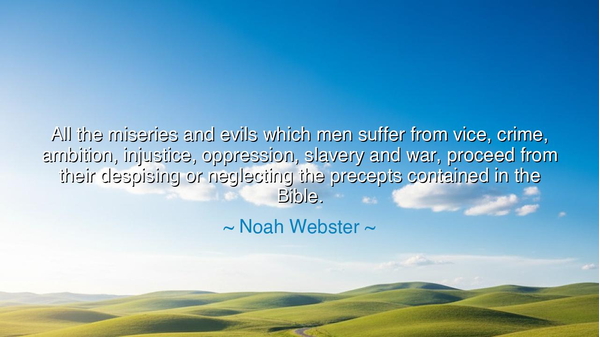
All the miseries and evils which men suffer from vice, crime
All the miseries and evils which men suffer from vice, crime, ambition, injustice, oppression, slavery and war, proceed from their despising or neglecting the precepts contained in the Bible.






In the shadows of human history, there are moments when the sufferings of mankind seem overwhelming—when the weight of vice, crime, ambition, injustice, oppression, slavery, and war presses upon the souls of men, and the world appears to be unraveling at its seams. The wise words of Noah Webster echo through the ages, reminding us that “All the miseries and evils which men suffer from vice, crime, ambition, injustice, oppression, slavery, and war, proceed from their despising or neglecting the precepts contained in the Bible.” Webster’s message is both simple and profound—that at the root of much of human suffering lies a failure to honor the sacred wisdom found in the teachings of the Bible.
In the ancient world, the wisdom of sacred texts was considered the cornerstone of civilization. The laws of the land were often believed to be divinely inspired, and society was seen as built upon a foundation of moral principles that guided its people toward peace and justice. The great Code of Hammurabi, one of the earliest known legal codes, echoed many of these principles, aiming to protect the weak from the strong, and establishing rules for fair conduct. In the same vein, the Bible, particularly its commandments and moral teachings, has long been viewed as a guiding light, a compass to navigate the tumult of human life. To neglect or dismiss these precepts is to drift aimlessly on the seas of chaos, subject to the storms of evil that have plagued humanity for centuries.
Webster’s words strike at the heart of a powerful truth—the decay of virtue in human society is often the result of a disregard for the moral teachings that bind us together. When men and women forsake the moral compass provided by the Bible, they fall prey to the temptations of vice and crime, driven by unchecked ambition and selfish desires. The ancient world, though different in many ways, was no stranger to these forces. The Greeks and Romans, with their gods of power and conquest, fell victim to similar passions, leading to their eventual decline. Rome, once a beacon of civilization, was brought low by the very vices that it had initially sought to suppress—corruption, excess, and the lust for power. In the face of these forces, it became clear that even the mightiest empires could not stand without a foundation of moral principles.
History bears witness to the destructive power of neglecting these moral foundations. Consider the tragic example of slavery—an institution that, for centuries, dehumanized millions and shattered the fabric of societies. Despite the teachings of justice and equality found in sacred texts, men and women allowed themselves to rationalize the oppression of others, viewing the world through lenses tainted by greed and power. In the United States, the Civil War was fought over these very issues, with one side clinging to the oppressive system of slavery, while the other fought for the freedom and equality promised by the teachings of the Bible. The scars of this struggle, and the lingering effects of injustice and inequality, still haunt societies today, reminding us of the cost of ignoring the precepts of moral law.
Similarly, war—a force that has ravaged civilizations from ancient times to the present—has its roots in the failure to adhere to the principles of peace, justice, and compassion. The wars fought by great empires, from Alexander to Napoleon, were often fueled by unchecked ambition and the desire for power. Yet, in the stories of these warriors, there are often moments where the seeds of their downfall are planted in their disregard for the moral lessons that could have tempered their actions. Napoleon, for all his victories and conquests, met his end in the harsh cold of Russia, a fitting reminder that even the most great ambitions, when driven by selfishness and a disregard for humanity, lead only to destruction.
Thus, the lesson we must draw from Webster’s words is not just about the importance of reading or following the Bible, but about understanding the universal truths it contains. Whether one is religious or not, the moral principles found in this text—justice, equality, compassion, and humility—are the foundation of any civilized society. To live by these principles is to build a life that resists the forces of vice and crime, that rejects the temptations of ambition and oppression, and that stands firm against the destructive winds of war. These principles, when embraced by individuals and communities, can lead to a life of peace and prosperity, just as their neglect has led to misery and destruction throughout history.
In our own lives, we must ask ourselves how we can contribute to the building of a just, peaceful world. Let us begin by looking inward, to the values we hold dear, and ensure that they align with the moral principles that have withstood the test of time. Let us act with compassion, seek justice, and stand against the forces of oppression and injustice wherever they may arise. By doing so, we honor the wisdom of the ancients and the teachings passed down through generations, recognizing that the path to a better world is paved with the adherence to the highest moral principles—principles that have the power to heal, to uplift, and to transform.






AAdministratorAdministrator
Welcome, honored guests. Please leave a comment, we will respond soon